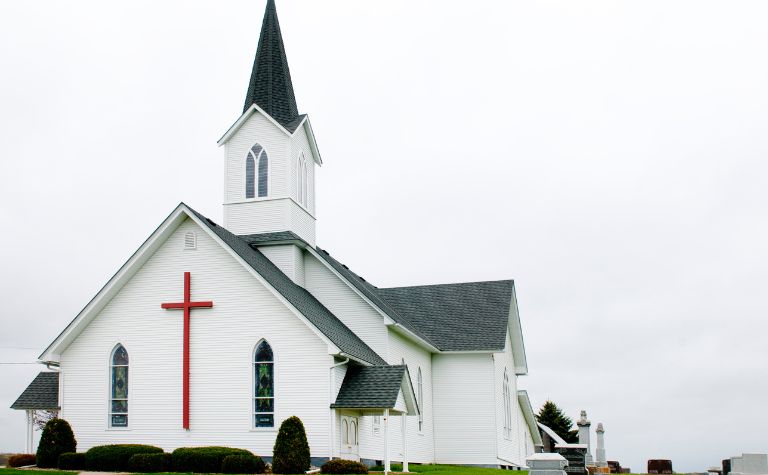Catholics and Protestants believe in the Trinity and the resurrection of Jesus Christ. They both practice baptism and the Lord’s Supper. Catholicism and Protestantism have important differences, too. But how significant are they? Does the Catholic Church teach that Protestants will go to heaven?
The Roman Catholic Church teaches that Protestants who are saved by Jesus Christ will go to heaven. Although there is no salvation outside the Church, Catholicism teaches that Protestant baptism is valid and invisibly connects believers to the bride of Christ, even if they worship in another tradition.
According to Catholic teaching, what does baptism have to do with Protestants going to heaven? Do Protestants have to receive the Eucharist to be saved? Do they have to go to confession? What do the catechisms teach? Keep reading to learn the answers to these questions and more.
Also, Protestant vs. Catholic vs. Orthodox: Similarities and Differences to learn more.

Does the Catholic Church Recognize Protestant Baptisms As Valid?
Catholicism teaches that it is the true church of Christ, and Protestant traditions — whether that is Baptist, Lutheran, Presbyterian, Episcopalian, Methodist, Assemblies of God, or any other — are not.
However, just because Protestant churches are not the true church does not mean that there are no aspects of them that are valid. (Also see Why Do Protestants Use Grape Juice at Communion?)
Is baptism necessary for salvation in Catholicism? The Church is necessary for salvation according to Catholic theology. Baptism is the figurative doorway into the true Church, which makes it necessary for salvation as well.
Those who are unaware of the Church’s teachings of these requirements, but demonstrate certain characteristics, may still be saved.
“Those who, through no fault of their own, do not know the Gospel of Christ or his Church, but who nevertheless seek God with a sincere heart, and moved by grace, try in their actions to do his will as they know it through the dictates of their conscience — those too may achieve eternal salvation.” [1] (Catechism of the Catholic Church 847)
Is baptism necessary for salvation in Protestantism? Baptism is not necessary for salvation according to the theology of most Protestant traditions.
Nevertheless, the Catholic church acknowledges the significant amount of similarities in the practice, accepting it as imperfect, but permissible obedience to the teachings of Christ and Scripture.
“He himself explicitly asserted the necessity of faith and Baptism, and thereby affirmed at the same time the necessity of the Church which men enter through Baptism as through a door. Hence they could not be saved who, knowing that the Catholic Church was founded as necessary by God through Christ, would refuse either to enter it or to remain in it.” [1] (CCC 846)
Do Catholic churches re-baptize Protestant converts? Catholic churches do not re-baptize converts who were previously baptized in Protestant churches.
This practice (or lack thereof) supports the Church’s teaching that Protestant baptisms are valid. If they were invalid, Catholic churches would rebaptize converts.
“The ordinary ministers of baptism are the bishop and priest and, in the Latin Church, also the deacon. In case of necessity, anyone, even a non-baptized person, with the required intention, can baptize by using the Trinitarian baptismal formula.”
The catechism continues, “The intention required is to will to do what the Church does when she baptizes. The Church finds the reason for this possibility in the universal saving will of God and the necessity of baptism for salvation.” [1] (CCC 1256)
Protestants have different methods of baptizing. Which ones are valid? Some Protestant traditions, like Lutheranism and Presbyterianism, baptize infants. Others, like Baptists and Assemblies of God, baptize adults. (Also see Do Protestants Have Confession?)
Some completely immerse a person in the water. Others pour water on a person’s head. Still, others sprinkle water on a person. As long as the person performing the baptism uses the Trinitarian formula — i.e., “in the name of the Father, Son, and Holy Spirit” — all of these practices are acceptable. [2]
“The Church knows that she is joined in many ways to the baptized who are honored by the name of Christian, but do not profess the Catholic faith in its entirety or have not preserved unity or communion under the successor of Peter.”
The catechism continues, “Those who believe in Christ and have been properly baptized are put in a certain, although imperfect, communion with the Catholic Church.” [1] (CCC 838)

Is Receiving the Eucharist Necessary To Go To Heaven?
The Catholic Church teaches that the Eucharist is necessary for salvation. However, the Church distinguishes between those who reject the Eucharist “with grave culpability” and those who do not. [3]
Believers who never receive the Eucharist, but have been validly baptized, are part of the true church and are saved. (Also see Why Don’t Protestants Believe in Transubstantiation?)
In Catholicism, it is common to refer to validly baptized Christians in Protestant churches as being in “imperfect” communion with the true church.
A Protestant’s relationship with the true Church is not ideal, and they are missing out on blessings that God wants them to have; nevertheless, they are saved and go to heaven when they die.
Is Confession Necessary To Go To Heaven?
Confession is necessary for the forgiveness of sins in Catholicism. In the absence of a priest that can absolve a person’s sin, God looks at the heart. (Also see Why Don’t Protestants Use Crucifixes?)
For example, if death is imminent and a person does not have access to a priest, a sincere sorrow for sin is acceptable to God. Similarly, Protestants can be saved and go to heaven without ever having made a confession to a priest.
“When it arises from a love by which God is loved above all else, contrition is called “perfect” (contrition of charity). Such contrition remits venial sins; it also obtains forgiveness of mortal sins if it includes the firm resolution to have recourse to sacramental confession as soon as possible.” (CCC 1452)

Summary: Protestants Can Go To Heaven According To Catholicism
Protestants can go to heaven when they die, according to the Catholic church’s teachings. However, the Catholic church also invited and encourages Protestant Christians to be a part of the true church rather than an imperfect form of it. (Also see Do Protestant Churches Have Nuns?)
Why can Protestants be saved despite not being part of the true church? In one sense, the answer to this question is it is because they have a valid baptism.
In a broader sense, it is because God, in his gracious goodness, wants all people to be saved, “The Lord is not slow to fulfill his promise as some count slowness, but is patient toward you, not wishing that any should perish, but that all should reach repentance.” (2 Peter 3:9, ESV)
Please see the related articles below.
References:
[1] Source
[2] Source
[3] Source
Related Questions
The Bible teaches believers to anticipate heaven with hope and joy. People will live forever with God and other believers because of the redemption that Jesus Christ earned for them through his death...
The reality of heaven leads many people to wonder about who enters it when they die, and on what basis. The Bible teaches that if people confess and repent of sin and put their trust in the death and...
